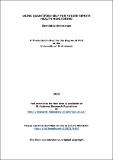Files in this item
Using quantified-self for future remote health monitoring
Item metadata
| dc.contributor.advisor | Bhatti, Saleem Noel | |
| dc.contributor.author | Khorakhun, Chonlatee | |
| dc.coverage.spatial | 268 p. | en_US |
| dc.date.accessioned | 2016-09-08T14:34:55Z | |
| dc.date.available | 2016-09-08T14:34:55Z | |
| dc.date.issued | 2015 | |
| dc.identifier.uri | https://hdl.handle.net/10023/9460 | |
| dc.description.abstract | Remote monitoring is an essential part of future mHealth systems for the delivery of personal and pervasive healthcare, especially to allow the collection of personal bio-data outside clinical environments. mHealth involves the use of mobile technologies including sensors and smart phones with Internet connectivity to collect personal bio-data. Yet, by its very nature, it presents considerable challenges: (1) it will be a highly distributed task, (2) requiring collection of bio-data from a myriad of sources, (3) to be gathered at the clinical site, (4) and via secure communication channels. To address these challenges, we propose the use of an online social network (OSN) based on the quantified-self, i.e. the use of wearable sensors to monitor, collect and distribute personal bio-data, as a key component of a near-future remote health monitoring system. Additionally, the use of a social media context allows existing social interactions within the healthcare regime to be modeled within a carer network, working in harmony with, and providing support for, existing relationships and interactions between patients and healthcare professionals. We focus on the use of an online social media platform (OSMP) to enable two primitive functions of quantified-self which we consider essential for mHealth, and on which larger personal healthcare services could be built: remote health monitoring of personal bio-data, and an alert system for asynchronous notifications. We analyse the general requirements in a carer network for these two primitive functions, in terms of four different viewpoints within the carer network: the patient, the doctor in charge, a professional carer, and a family member (or friend) of the patient. We propose that a wellbeing remote monitoring scenario can act as a suitable proxy for mHealth monitoring by the use of an OSN. To allow rapid design, experimentation and evaluation of mHealth systems, we describe our experience of creating an mHealth system based on a wellbeing scenario, exploiting the quantified-self approach of measurement and monitoring. The use of wellbeing data in this manner is particularly valuable to researchers and systems developers, as key development work can be completed within a realistic scenario, but without risk to sensitive patient medical data. We discuss the suitability of using wellbeing monitoring as a proxy for mHealth monitoring with OSMPs in terms of functionality, performance and the key challenge in ensuring appropriate levels of security and privacy. We find that OSMPs based on quantified-self offer great potential for enabling personal and pervasive healthcare in an mHealth scenario. | en_US |
| dc.language.iso | en | en_US |
| dc.publisher | University of St Andrews | |
| dc.subject.lcc | R859.7U27K5 | |
| dc.title | Using quantified-self for future remote health monitoring | en_US |
| dc.type | Thesis | en_US |
| dc.type.qualificationlevel | Doctoral | en_US |
| dc.type.qualificationname | PhD Doctor of Philosophy | en_US |
| dc.publisher.institution | The University of St Andrews | en_US |
This item appears in the following Collection(s)
Items in the St Andrews Research Repository are protected by copyright, with all rights reserved, unless otherwise indicated.

